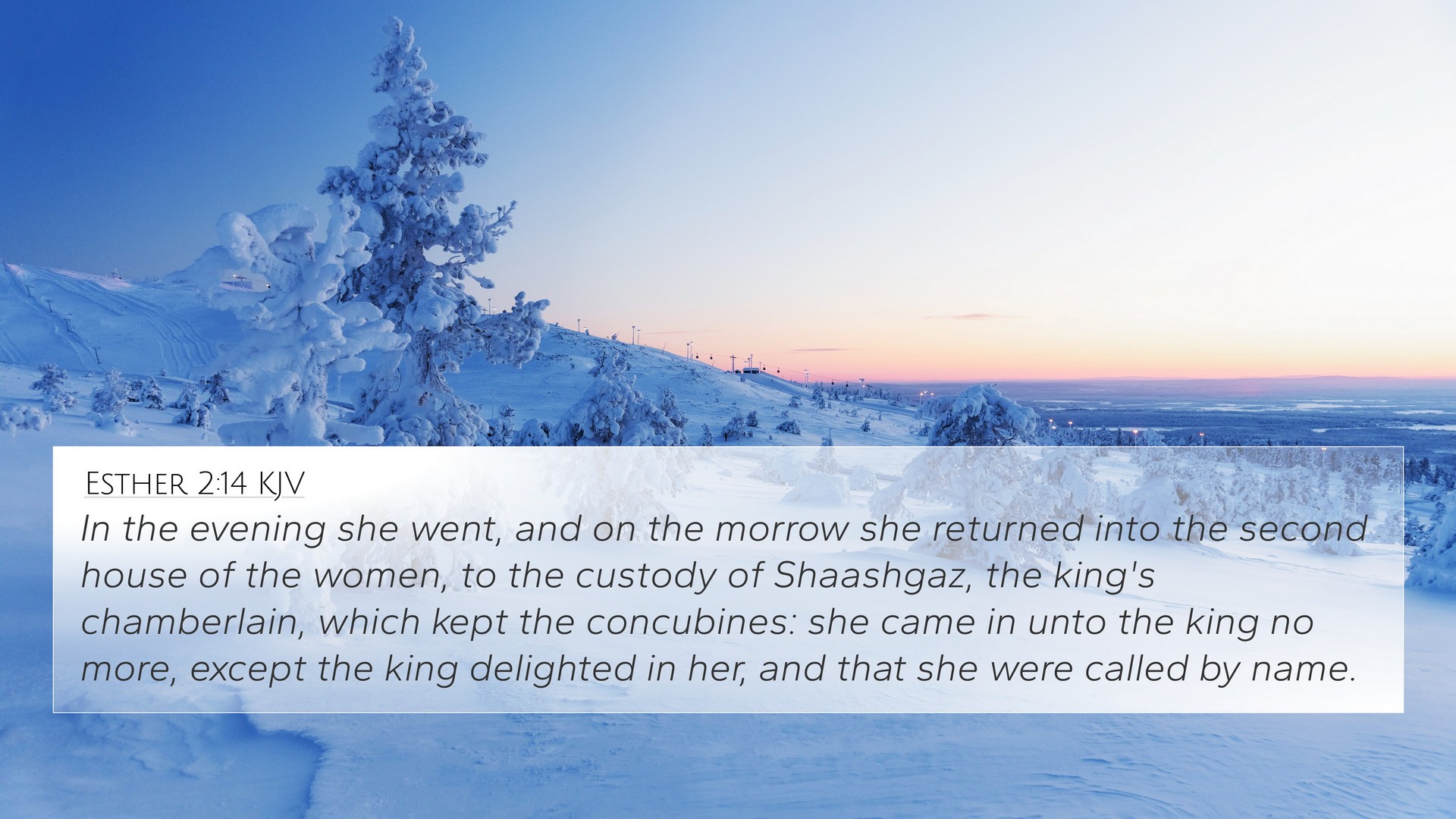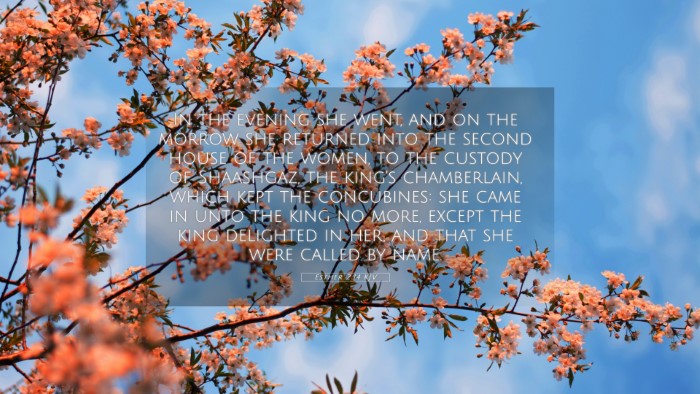Old Testament
Genesis Exodus Leviticus Numbers Deuteronomy Joshua Judges Ruth 1 Samuel 2 Samuel 1 Kings 2 Kings 1 Chronicles 2 Chronicles Ezra Nehemiah Esther Job Psalms Proverbs Ecclesiastes Song of Solomon Isaiah Jeremiah Lamentations Ezekiel Daniel Hosea Joel Amos Obadiah Jonah Micah Nahum Habakkuk Zephaniah Haggai Zechariah MalachiEsther 2:14 Similar Verses
Esther 2:14 Cross References
In the evening she went, and on the morrow she returned into the second house of the women, to the custody of Shaashgaz, the king's chamberlain, which kept the concubines: she came in unto the king no more, except the king delighted in her, and that she were called by name.
Uncover the Rich Themes and Topics of This Bible Verse
Listed below are the Bible themes associated with Esther 2:14. We invite you to explore each theme to gain deeper insights into the Scriptures.
Esther 2:14 Cross Reference Verses
This section features a detailed cross-reference designed to enrich your understanding of the Scriptures. Below, you will find carefully selected verses that echo the themes and teachings related to Esther 2:14 KJV. Click on any image to explore detailed analyses of related Bible verses and uncover deeper theological insights.
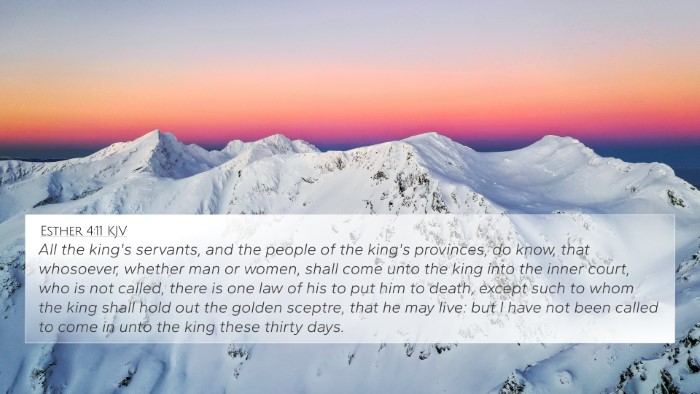
Esther 4:11 (KJV) »
All the king's servants, and the people of the king's provinces, do know, that whosoever, whether man or women, shall come unto the king into the inner court, who is not called, there is one law of his to put him to death, except such to whom the king shall hold out the golden sceptre, that he may live: but I have not been called to come in unto the king these thirty days.
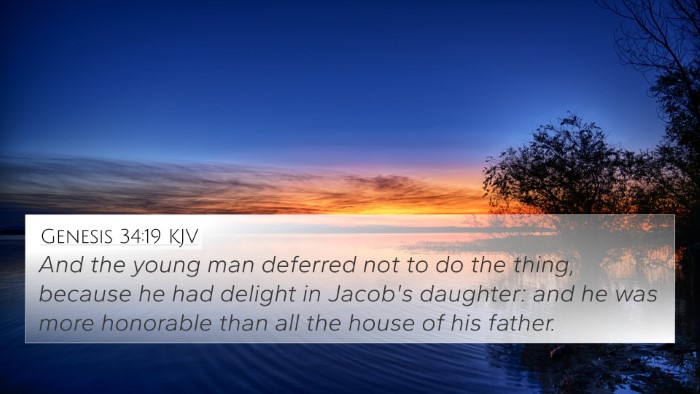
Genesis 34:19 (KJV) »
And the young man deferred not to do the thing, because he had delight in Jacob's daughter: and he was more honorable than all the house of his father.

Deuteronomy 21:14 (KJV) »
And it shall be, if thou have no delight in her, then thou shalt let her go whither she will; but thou shalt not sell her at all for money, thou shalt not make merchandise of her, because thou hast humbled her.
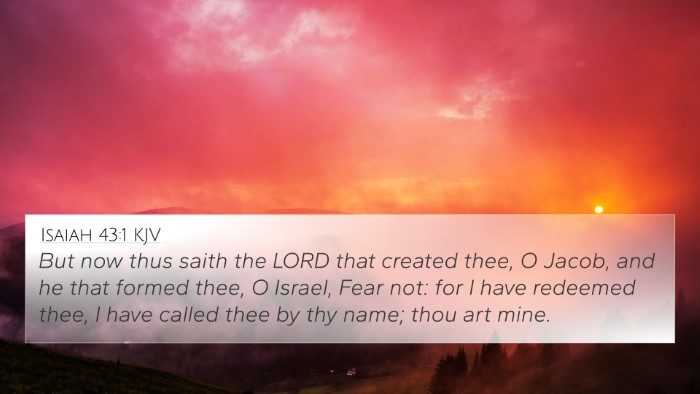
Isaiah 43:1 (KJV) »
But now thus saith the LORD that created thee, O Jacob, and he that formed thee, O Israel, Fear not: for I have redeemed thee, I have called thee by thy name; thou art mine.
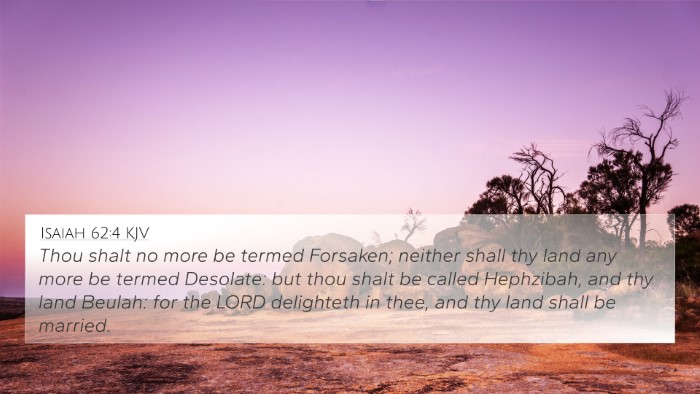
Isaiah 62:4 (KJV) »
Thou shalt no more be termed Forsaken; neither shall thy land any more be termed Desolate: but thou shalt be called Hephzibah, and thy land Beulah: for the LORD delighteth in thee, and thy land shall be married.
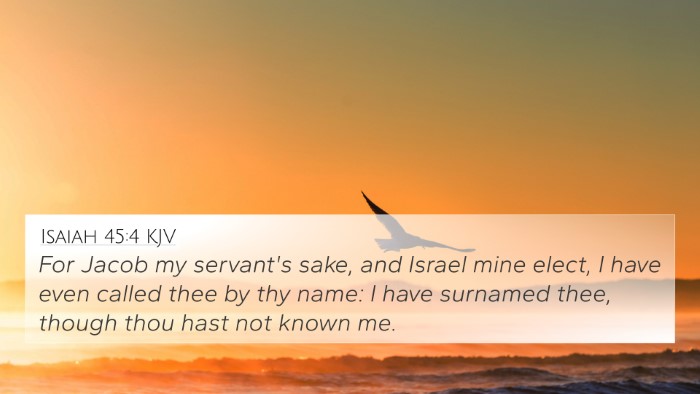
Isaiah 45:4 (KJV) »
For Jacob my servant's sake, and Israel mine elect, I have even called thee by thy name: I have surnamed thee, though thou hast not known me.
Esther 2:14 Verse Analysis and Similar Verses
Understanding Esther 2:14
Esther 2:14 states: "In the evening she went, and on the morrow she returned into the second house of the women, to the custody of Shaashgaz, the king's chamberlain, which kept the concubines: she came in unto the king no more, except the king delighted in her, and that she were called by name."
Summary of the Verse
This verse describes Esther's experience in the royal harem and her restricted access to the king. After spending the night with the king, she returned to the second house of women, her fate dependent on the king's favor, indicating the precarious position of women in this royal setting.
Insights from Commentaries
Matthew Henry's Commentary
Henry reflects on the loneliness and isolation Esther faces. He points out how her situation illustrates the trials and tribulations that accompany her journey to becoming queen. Furthermore, he underscores that Esther's role is not merely one of beauty but involves a deeper providential call that unfolds throughout the narrative.
Albert Barnes' Notes
Barnes highlights the significance of the king's delight as pivotal for Esther's future. He notes that the women in the harem have little autonomy, and Esther's beauty and character are essential in determining her favor with the king. He also draws comparisons between Esther's situation and that of other women in the Scripture, emphasizing the theme of divine providence in her path.
Adam Clarke's Commentary
Clarke points out the cultural norms of the time regarding women and their roles. He elaborates on the significance of Esther's beauty, which is more than skin deep; it symbolizes a unique divine purpose. Clarke also elaborates on how Esther's story ties into the larger Biblical narrative of God's protection and provision for His people during their exile.
Thematic Connections and Cross-References
Esther 2:14 resonates with numerous other Biblical texts. The following verses illustrate themes of divine favor, beauty, and providential guidance:
- 1 Samuel 16:7 - "But the Lord said unto Samuel, Look not on his countenance, or on the height of his stature; because I have refused him: for the Lord seeth not as man seeth; for man looketh on the outward appearance, but the Lord looketh on the heart."
- Proverbs 31:30 - "Favor is deceitful, and beauty is vain: but a woman that feareth the Lord, she shall be praised."
- Psalms 22:24 - "For he hath not despised nor abhorred the affliction of the afflicted; neither hath he hid his face from him; but when he cried unto him, he heard."
- Esther 4:14 - "For if thou altogether holdest thy peace at this time, then shall there enlargement and deliverance arise to the Jews from another place; but thou and thy father's house shall be destroyed: and who knoweth whether thou art come to the kingdom for such a time as this?"
- Isaiah 49:15 - "Can a woman forget her sucking child, that she should not have compassion on the son of her womb? yea, they may forget, yet will I not forget thee."
- Luke 1:30-31 - "And the angel said unto her, Fear not, Mary: for thou hast found favor with God. And, behold, thou shalt conceive in thy womb, and bring forth a son, and shalt call his name Jesus."
- Matthew 5:14-16 - "Ye are the light of the world. A city that is set on a hill cannot be hid. Neither do men light a candle, and put it under a bushel, but on a candlestick, and it giveth light unto all that are in the house."
Conclusion
The account of Esther in Esther 2:14 is rich with implications and demonstrates intricate connections within Scripture. It invites readers to explore the complex dynamics of beauty, favor, and divine intervention in the lives of God's people. Understanding this verse within its broader Biblical context enhances our awareness of thematic continuities, cross-referencing Biblical texts, and recognizing God’s providence throughout Scripture.
Further Exploration
For those interested in Bible verse cross-references and thematic Bible verse connections, consider using tools for Bible cross-referencing, such as a Bible concordance or cross-reference Bible study methods. Engaging in comparative Bible verse analysis can also yield deeper insights into the connections between Esther and other narratives, enriching our understanding of God's overarching plan within His Word.
